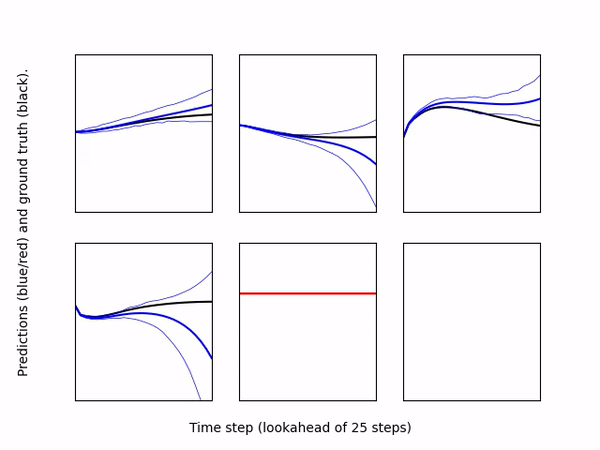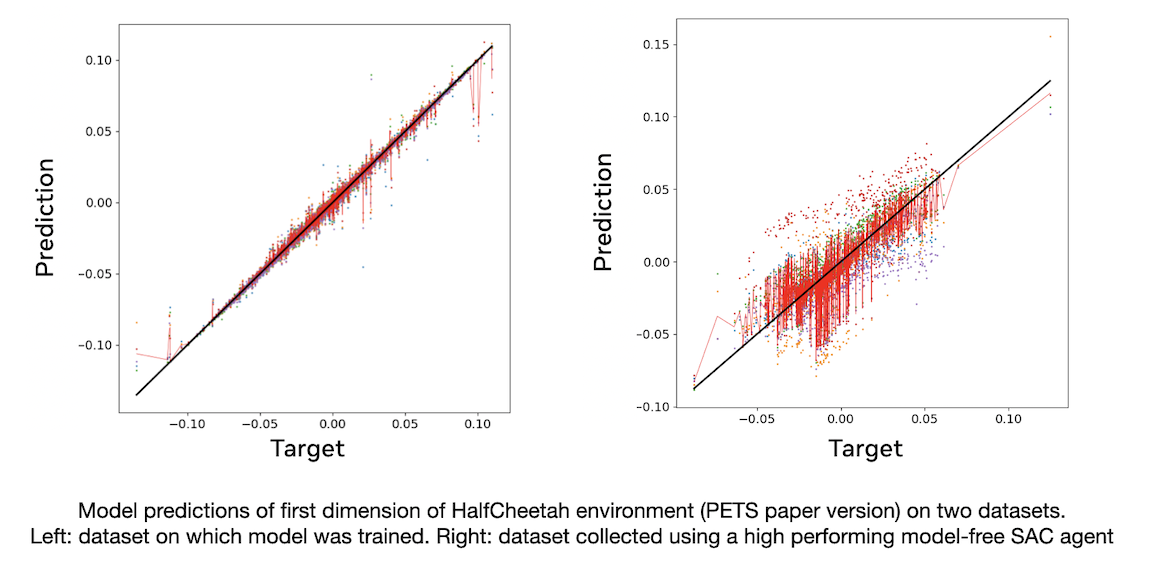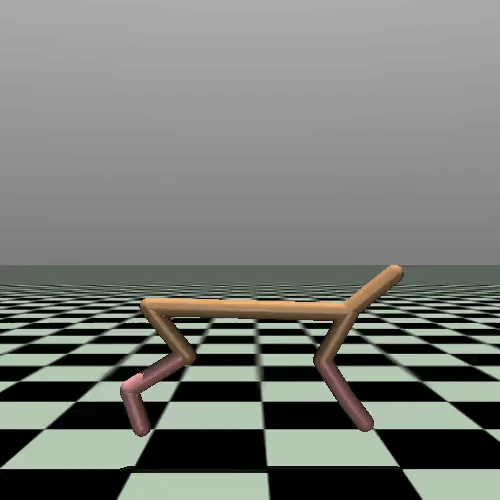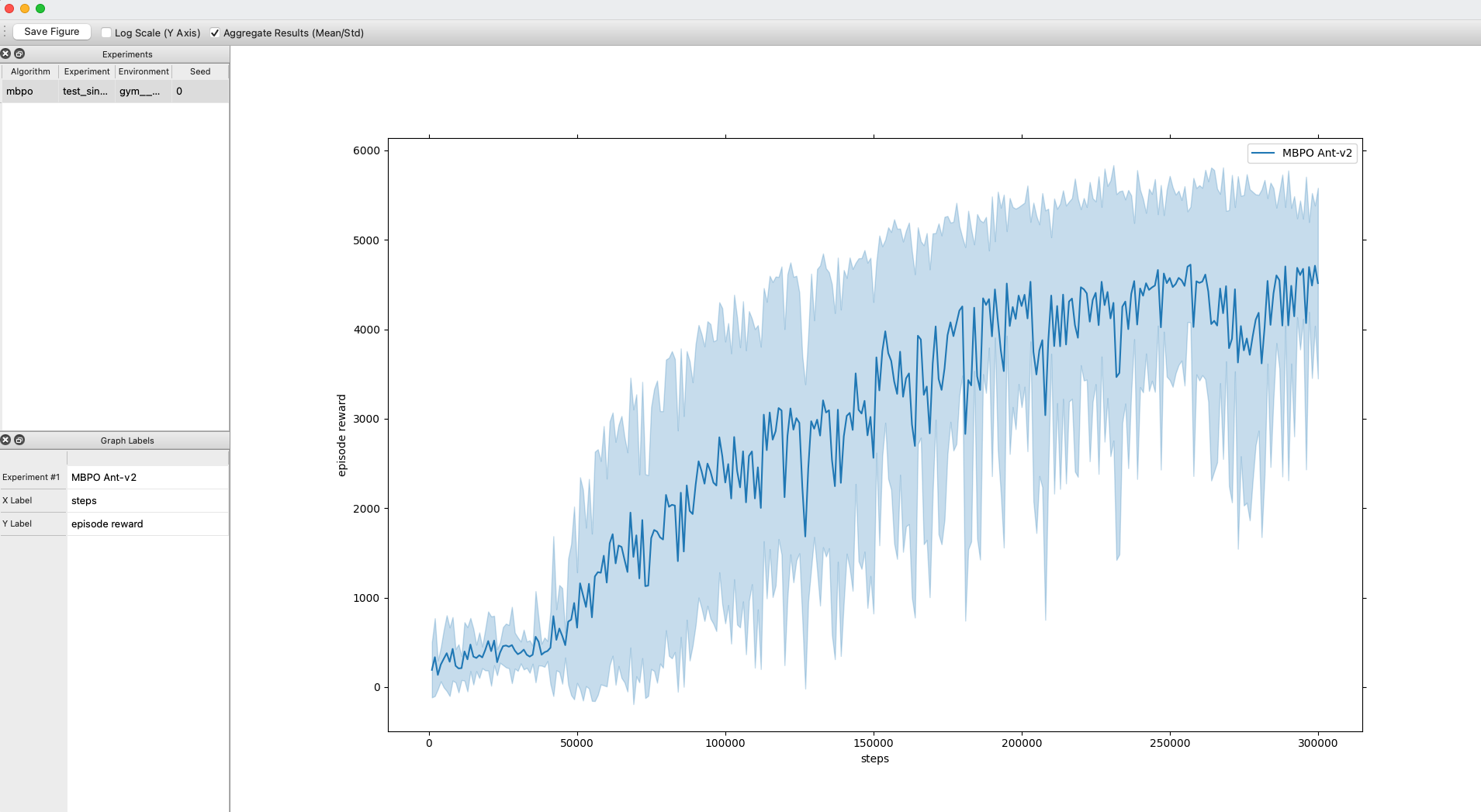Ecosyste.ms: Awesome
An open API service indexing awesome lists of open source software.
https://github.com/facebookresearch/mbrl-lib
Library for Model Based RL
https://github.com/facebookresearch/mbrl-lib
model-based-reinforcement-learning reinforcement-learning
Last synced: about 2 months ago
JSON representation
Library for Model Based RL
- Host: GitHub
- URL: https://github.com/facebookresearch/mbrl-lib
- Owner: facebookresearch
- License: mit
- Created: 2020-08-17T13:03:30.000Z (almost 4 years ago)
- Default Branch: main
- Last Pushed: 2023-07-26T19:25:35.000Z (11 months ago)
- Last Synced: 2024-05-04T16:02:02.675Z (about 2 months ago)
- Topics: model-based-reinforcement-learning, reinforcement-learning
- Language: Python
- Homepage:
- Size: 33.6 MB
- Stars: 912
- Watchers: 24
- Forks: 151
- Open Issues: 21
-
Metadata Files:
- Readme: README.md
- Changelog: CHANGELOG.md
- Contributing: CONTRIBUTING.md
- License: LICENSE
- Code of conduct: CODE_OF_CONDUCT.md
Lists
- awesome-model-based-RL - mbrl-lib - Meta: Library for Model Based RL (Codebase / Other)
- awesome-deep-reinforcement-learning - facebookresearch/mbrl-lib - lib)](https://github.com/facebookresearch/mbrl-lib/stargazers)  (Reinforcement Learning (RL) and Deep Reinforcement Learning (DRL) / RL/DRL Algorithm Implementations and Software Frameworks)
README
[](https://pypi.org/project/mbrl/)
[](https://github.com/facebookresearch/mbrl-lib/actions?query=workflow%3ACI)
[](https://github.com/facebookresearch/mbrl-lib/tree/main/LICENSE)
[](https://www.python.org/downloads/release/python-360/)
[](https://github.com/psf/black)
# MBRL-Lib
``mbrl`` is a toolbox for facilitating development of
Model-Based Reinforcement Learning algorithms. It provides easily interchangeable
modeling and planning components, and a set of utility functions that allow writing
model-based RL algorithms with only a few lines of code.
See also our companion [paper](https://arxiv.org/abs/2104.10159).
## Getting Started
### Installation
#### Standard Installation
``mbrl`` requires Python 3.8+ library and [PyTorch (>= 1.7)](https://pytorch.org).
To install the latest stable version, run
pip install mbrl
#### Developer installation
If you are interested in modifying the library, clone the repository and set up
a development environment as follows
git clone https://github.com/facebookresearch/mbrl-lib.git
pip install -e ".[dev]"
And test it by running the following from the root folder of the repository
python -m pytest tests/core
python -m pytest tests/algorithms
### Basic example
As a starting point, check out our [tutorial notebook](https://github.com/facebookresearch/mbrl-lib/tree/main/notebooks/pets_example.ipynb)
on how to write the PETS algorithm
([Chua et al., NeurIPS 2018](https://arxiv.org/pdf/1805.12114.pdf))
using our toolbox, and running it on a continuous version of the cartpole
environment.
## Provided algorithm implementations
MBRL-Lib provides implementations of popular MBRL algorithms
as examples of how to use this library. You can find them in the
[mbrl/algorithms](https://github.com/facebookresearch/mbrl-lib/tree/main/mbrl/algorithms) folder. Currently, we have implemented
[PETS](https://github.com/facebookresearch/mbrl-lib/tree/main/mbrl/algorithms/pets.py),
[MBPO](https://github.com/facebookresearch/mbrl-lib/tree/main/mbrl/algorithms/mbpo.py),
[PlaNet](https://github.com/facebookresearch/mbrl-lib/tree/main/mbrl/algorithms/planet.py),
we plan to keep increasing this list in the future.
The implementations rely on [Hydra](https://github.com/facebookresearch/hydra)
to handle configuration. You can see the configuration files in
[this](https://github.com/facebookresearch/mbrl-lib/tree/main/mbrl/examples/conf)
folder.
The [overrides](https://github.com/facebookresearch/mbrl-lib/tree/main/mbrl/examples/conf/overrides)
subfolder contains
environment specific configurations for each environment, overriding the
default configurations with the best hyperparameter values we have found so far
for each combination of algorithm and environment. You can run training
by passing the desired override option via command line.
For example, to run MBPO on the [Gymnasium](https://github.com/Farama-Foundation/Gymnasium/) version of HalfCheetah, you should call
```python
python -m mbrl.examples.main algorithm=mbpo overrides=mbpo_halfcheetah
```
By default, all algorithms will save results in a csv file called `results.csv`,
inside a folder whose path looks like
`./exp/mbpo/default/gym___HalfCheetah-v2/yyyy.mm.dd/hhmmss`;
you can change the root directory (`./exp`) by passing
`root_dir=path-to-your-dir`, and the experiment sub-folder (`default`) by
passing `experiment=your-name`. The logger will also save a file called
`model_train.csv` with training information for the dynamics model.
Beyond the override defaults, You can also change other configuration options,
such as the type of dynamics model
(e.g., `dynamics_model=basic_ensemble`), or the number of models in the ensemble
(e.g., `dynamics_model.model.ensemble_size=some-number`). To learn more about
all the available options, take a look at the provided
[configuration files](https://github.com/facebookresearch/mbrl-lib/tree/main/mbrl/examples/conf).
## Supported environments
Our example configurations are largely based on [Mujoco](https://mujoco.org/), but
our library components (and algorithms) are compatible with any environment that follows
the standard [Gymnasium](https://github.com/Farama-Foundation/Gymnasium/) syntax. You can try our utilities in other environments
by creating your own entry script and Hydra configuration, using our default entry
[`main.py`](https://github.com/facebookresearch/mbrl-lib/blob/main/mbrl/examples/main.py) as guiding template.
See also the example [override](https://github.com/facebookresearch/mbrl-lib/tree/main/mbrl/examples/conf/overrides)
configurations.
Without any modifications, our provided `main.py` can be used to launch experiments with the following environments:
* [`mujoco`](https://github.com/deepmind/mujoco)
* [`dm_control`](https://github.com/deepmind/dm_control)
* [`pybullet-gym`](https://github.com/benelot/pybullet-gym) (thanks to [dtch1997](https://github.com/dtch1997)) for the contribution!
Note: You must run `pip install gym==0.26.3` to use the dm_control and pybulletgym environments.
You can test your Mujoco and PyBullet installations by running
python -m pytest tests/mujoco
python -m pytest tests/pybullet
To specify the environment to use for `main.py`, there are two possibilities:
* **Preferred way**: Use a Hydra dictionary to specify arguments for your env constructor. See [example](https://github.com/facebookresearch/mbrl-lib/blob/main/mbrl/examples/conf/overrides/planet_cartpole_balance.yaml#L4).
* Less flexible alternative: A single string with the following syntax:
- `mujoco-gym`: `"gym___"`, where `env-name` is the name of the environment in Gymnasium (e.g., "HalfCheetah-v2").
- `dm_control`: `"dmcontrol___--`, where domain/task are defined as in DMControl (e.g., "cheetah--run").
- `pybullet-gym`: `"pybulletgym___"`, where `env-name` is the name of the environment in pybullet gym (e.g., "HopperPyBulletEnv-v0")
## Visualization and diagnostics tools
Our library also contains a set of
[diagnostics](https://github.com/facebookresearch/mbrl-lib/tree/main/mbrl/diagnostics) tools, meant to facilitate
development and debugging of models and controllers. With the exception of the CPU-controller, which also supports
PyBullet, these currently require a Mujoco installation, but we are planning to add support for other environments
and extensions in the future. Currently, the following tools are provided:
* ``Visualizer``: Creates a video to qualitatively
assess model predictions over a rolling horizon. Specifically, it runs a
user specified policy in a given environment, and at each time step, computes
the model's predicted observation/rewards over a lookahead horizon for the
same policy. The predictions are plotted as line plots, one for each
observation dimension (blue lines) and reward (red line), along with the
result of applying the same policy to the real environment (black lines).
The model's uncertainty is visualized by plotting lines the maximum and
minimum predictions at each time step. The model and policy are specified
by passing directories containing configuration files for each; they can
be trained independently. The following gif shows an example of 200 steps
of pre-trained MBPO policy on Inverted Pendulum environment.
\
\

* ``DatasetEvaluator``: Loads a pre-trained model and a dataset (can be loaded from separate directories),
and computes predictions of the model for each output dimension. The evaluator then
creates a scatter plot for each dimension comparing the ground truth output
vs. the model's prediction. If the model is an ensemble, the plot shows the
mean prediction as well as the individual predictions of each ensemble member.
\
\

* ``FineTuner``: Can be used to train a model on a dataset produced by a given agent/controller.
The model and agent can be loaded from separate directories, and the fine tuner will roll the
environment for some number of steps using actions obtained from the
controller. The final model and dataset will then be saved under directory
"model_dir/diagnostics/subdir", where `subdir` is provided by the user.\
* ``True Dynamics Multi-CPU Controller``: This script can run
a trajectory optimizer agent on the true environment using Python's
multiprocessing. Each environment runs in its own CPU, which can significantly
speed up costly sampling algorithm such as CEM. The controller will also save
a video if the ``render`` argument is passed. Below is an example on
HalfCheetah-v2 using CEM for trajectory optimization. To specify the environment,
follow the single string syntax described
[here](https://github.com/facebookresearch/mbrl-lib/blob/main/README.md#supported-environments).
\
\

* [``TrainingBrowser``](training_browser.py): This script launches a lightweight
training browser for plotting rewards obtained after training runs
(as long as the runs use our logger).
The browser allows aggregating multiple runs and displaying mean/std,
and also lets the user save the image to hard drive. The legend and axes labels
can be edited in the pane at the bottom left. Requires installing `PyQt5`.
Thanks to [a3ahmad](https://github.com/a3ahmad) for the contribution!

Note that, except for the training browser, all the tools above require Mujoco
installation and are specific to models of type
[``OneDimTransitionRewardModel``](../models/one_dim_tr_model.py).
We are planning to extend this in the future; if you have useful suggestions
don't hesitate to raise an issue or submit a pull request!
## Advanced Examples
MBRL-Lib can be used for many different research projects in the subject area.
Below are some community-contributed examples:
* [Trajectory-based Dynamics Model](https://arxiv.org/abs/2012.09156) Training [](https://colab.research.google.com/github/natolambert/mbrl-lib-dev/blob/main/notebooks/traj_based_model.ipynb)
* Using HuggingFace Hub Integration for saving and loading models: [](https://colab.research.google.com/drive/1Awp4sSGFgz8nARyfonBGsLrgRWrbqChx?usp=sharing#scrollTo=SX1JYR_bJNWf)
## Documentation
Please check out our **[documentation](https://facebookresearch.github.io/mbrl-lib/)**
and don't hesitate to raise issues or contribute if anything is unclear!
## License
`mbrl` is released under the MIT license. See [LICENSE](LICENSE) for
additional details about it. See also our
[Terms of Use](https://opensource.facebook.com/legal/terms) and
[Privacy Policy](https://opensource.facebook.com/legal/privacy).
## Citing
If you use this project in your research, please cite:
```BibTeX
@Article{Pineda2021MBRL,
author = {Luis Pineda and Brandon Amos and Amy Zhang and Nathan O. Lambert and Roberto Calandra},
journal = {Arxiv},
title = {MBRL-Lib: A Modular Library for Model-based Reinforcement Learning},
year = {2021},
url = {https://arxiv.org/abs/2104.10159},
}
```